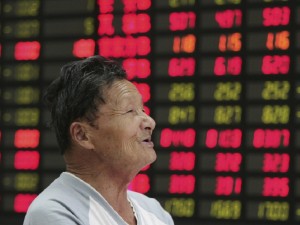
An investor smiles at the stock price monitor at a private securities company in Shanghai, China. Asian stock markets moved cautiously higher as European leaders inched toward a plan for containing a debt crisis that threatens to derail global economic growth. AP
HONG KONG — Asian markets were mostly lower Thursday following weak leads from Wall Street as worries returned over whether eurozone leaders can agree on measures to resolve their debt crisis.
The caution comes ahead of a new European Union-International Monetary Fund audit of Greece’s progress under its 110 billion euro ($150 billion) bailout, as well as a German parliamentary vote on the new eurozone rescue plan.
Tokyo was down 1.02 percent at the open with the benchmark Nikkei 225 index 88.01 points lower at 8,527.64.
Sydney slipped more than 1.5 percent in early trade but Seoul shifted into positive territory after opening in the red. The benchmark KOSPI was up 0.66 points, or 0.04 percent, at 1,723.75 in the first 15
minutes of trading.
The tone was set by see-sawing sessions in the United States and
Europe. Bourses opened higher but sank toward the close, with US
stocks taking a sharp drop in the last hour of trade, ending three
straight days of advances.
The Dow Jones Industrial Average ended 1.61 percent lower at
11,010.90, while the broader S&P 500 gave up 2.07 percent to 1,151.06 and the Nasdaq Composite lost 2.17 percent to 2,491.58.
Stocks came under the shadow of a push in Europe Wednesday on landmark proposals to tax the financial sector, ignoring US opposition in a move also sure to provoke a row with London which fears capital flight from the city.
But the main worry continues to be the ongoing Greek crisis.
“It seems investors are questioning initial optimism over whether eurozone leaders will put in place comprehensive measures for crisis resolution,” said IG Markets analysts Ben Potter in Sydney.
“Angela Merkel caused further fears when she addressed the nation, suggesting Greece’s budget numbers in September may be different from previous estimates, effectively putting the second bailout into question.”
The Financial Times on Wednesday said Greece’s second bailout had run into trouble, with some eurozone members pushing for private creditors to take a bigger writedown on their Greek bond holdings.
On foreign exchange markets, the euro lost ground against major
currencies early Thursday amid the signs of divisions among European policymakers.
The euro was trading at $1.3521, compared to $1.3536 in New York late Wednesday. Against the Japanese currency, the euro fell to 103.51 yen from 103.60 yen.
The dollar remained unchanged against the yen at 76.54.
Oil prices slid after data showed a bigger than expected increase in
energy stockpiles in the United States, indicating weak demand in the world’s biggest economy.
New York’s main contract, West Texas Intermediate (WTI) for delivery in November, fell $3.24 to close $81.21 a barrel.
In London, Brent North Sea crude for November dropped $3.33 to settle at $103.81 a barrel.
Gold was at $1,588 an ounce by 0100 GMT, down from $1,637.10 where it stood at 0600 GMT on Wednesday.